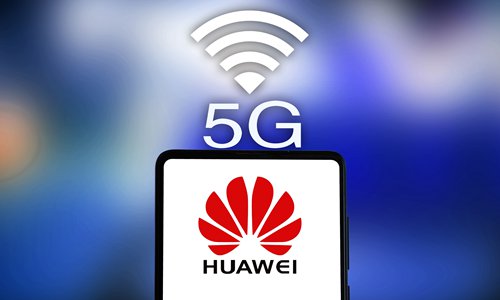Washington’s ‘Marshall Plan’ for 5G competition has no chance of success
By Fang Xingdong Source:Global Times Published: 2019/10/30 19:45:37

Photo: IC
Chinese telecom giant Huawei has made new progress on 5G construction both domestically and abroad. On Friday, the company said it has obtained China's first 5G network license for a base station. On Sunday, it was reported that British Prime Minister Boris Johnson is about to grant Huawei access to future 5G telecoms network in the UK.
Chinese enterprises are exerting an increasing influence on global 5G networks, setting some Westerners' teeth on edge. The US has taken measures to crack down on Huawei, which remind me of the Marshall Plan after WWII.
In the past two years, the US has sent several high-level officials to lobby European countries, asking them to take sides and ban Chinese 5G equipment. But in spite of these threats from US politicians such as Secretary of State Mike Pompeo, European countries do not seem willing to act upon whatever Washington says.
In addition to the UK, Germany has made a similar decision. The major European power has finalized rules regarding 5G mobile networks, saying that Huawei will not be excluded. "We are not taking a pre-emptive decision to ban any actor, or any company," said German government spokesman Steffen Seibert on October 14.
Even Washington has to recognize the fact that Huawei has not been struck down, although the US has cracked down on this company with extreme measures such as declaring a national emergency. The US has also attempted to contain Huawei on a global scale, but its attempts have been only in vain. Washington is playing new tricks. It is reported that the US administration may take actions including providing loans to Huawei's Western competitors such as Nokia and Ericsson, introducing incentive measures to urge US companies to invest in new 5G technologies, and encouraging local enterprises to join the International Telecommunication Union through tax reduction and exemption.
The US failed to crack down on Huawei through political means and thus failed to contain China's rise in the global 5G competition. But Washington is reluctant to give up. The core purpose of its tricks is to maintain its unique hegemonic position in global cyberspace. But this clearly lacks any factual and moral basis.
First, no evidence to date has shown Chinese companies such as Huawei are an insecure factor in global cyberspace. On the contrary, many serious cybersecurity problems were proved to be connected with the US.
Second, 5G equipment is merely one of many parts of network security. Chips, operating systems, and data platforms are more critical than devices.
Third, the fundamentals of solving cybersecurity issues are technological and systematic norms as well as the consequent global collaboration, which does not require every country to independently manufacture its own equipment. Washington is taking actions only because the 5G equipment became the first unstable part of the US-dominated chain. Its measures are not taken for the purpose of addressing global network security.
People can find that Washington's attempts to draw Europe to its side are not a bid to protect European security, but to maintain its own hegemonic status. Judging by the frequent cybersecurity incidents in recent years, the biggest challenge facing Europe is not the network equipment issue, but the lack of competitiveness of its own industries.
Europe does need to catch up in the digital age. However, the key is not security, but development issues such as enhancing competitiveness of digital technology and the digital economy. In this regard, the strategic value of further cooperation between Europe and China is undoubtedly more significant than that between Europe and the US.
Even if Washington's new measures are implemented, it will encounter obstacles. On the one hand, interference in market competition and man-made sabotage of the global industrial chain can hardly work in the long run. On the other hand, the true purpose of the US will not be recognized and supported by Europe.
Fair, effective and innovative market competition on a global scale is one of the longest-lasting measures to deal with network security problems. It is necessary to break the long-term monopoly and effectively activate competition in various fields.
Hence, China should remain calm facing the US government's new tricks. In terms of openness of communication equipment market, today's Chinese market has undoubtedly acted as a global model. Maintaining open market competition is the only way to promote technological innovation and industrial development, as well as safeguard consumer rights. In addition, with increasingly serious cybersecurity challenges, strengthened global cooperation is needed.
The author is director of the Center for Internet and Society at Zhejiang University of Media and Communications and founder of Beijing-based technology think tank ChinaLabs. bizopinion@globaltimes.com.cn
Posted in: VIEWPOINT,CHINA-US